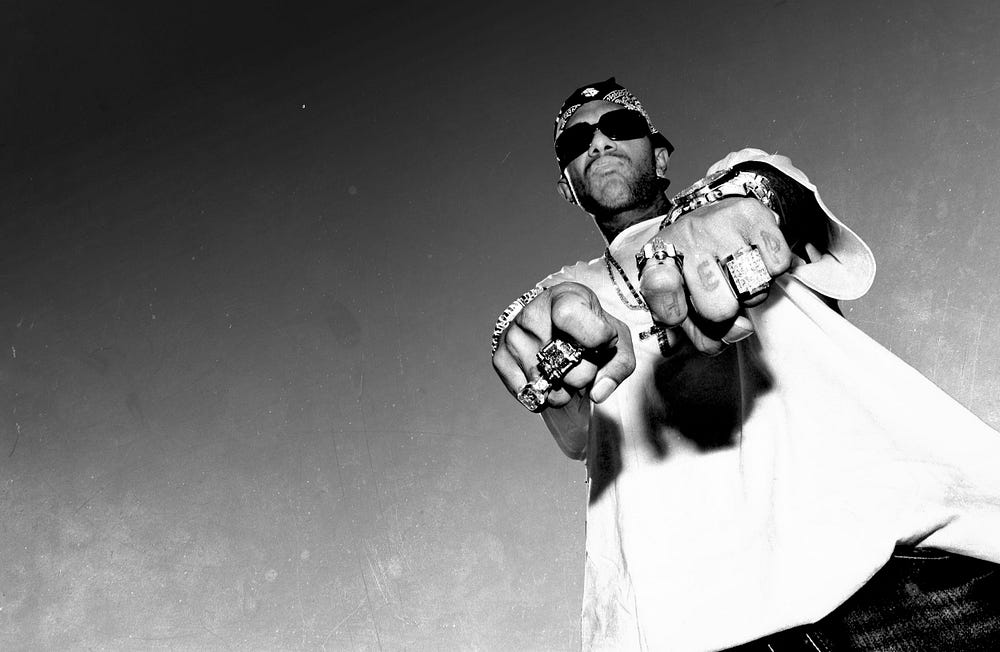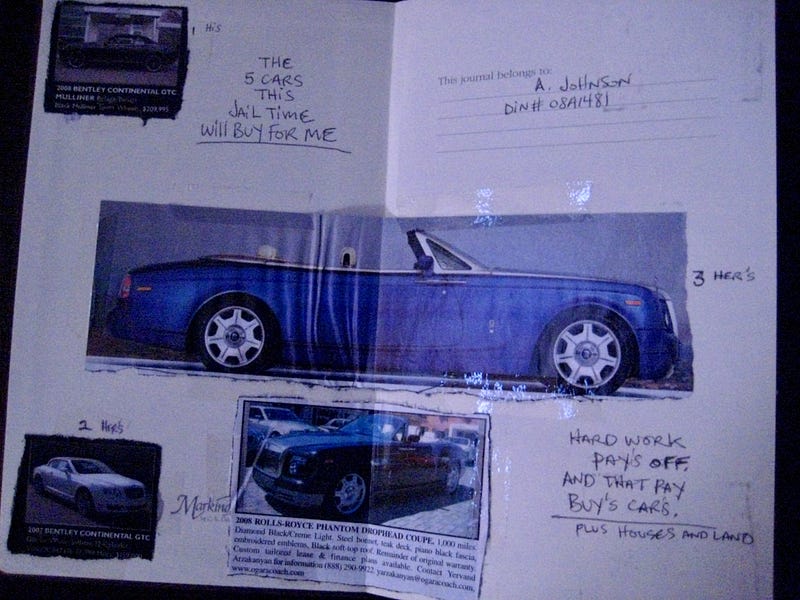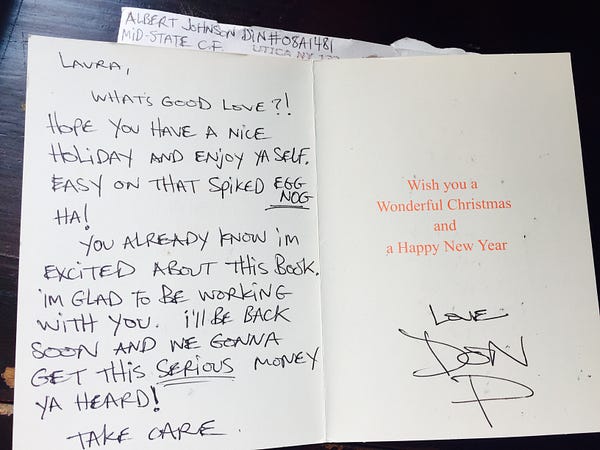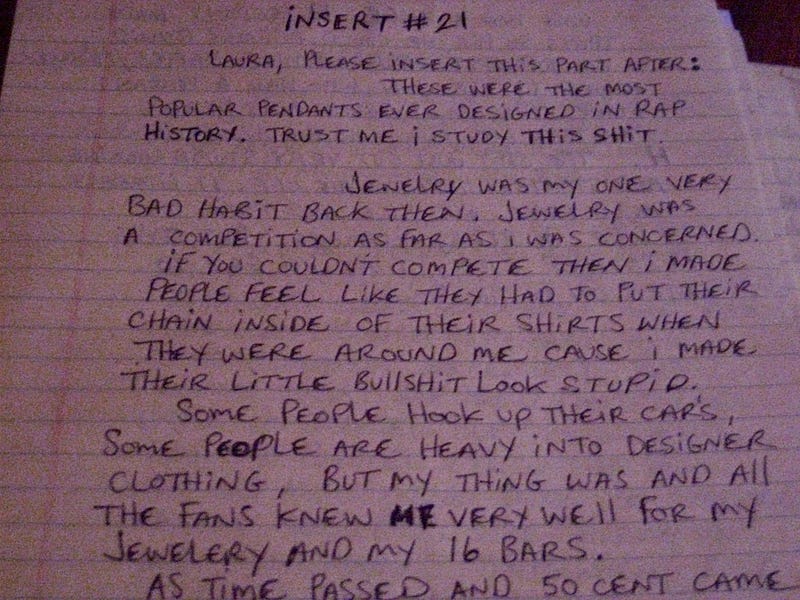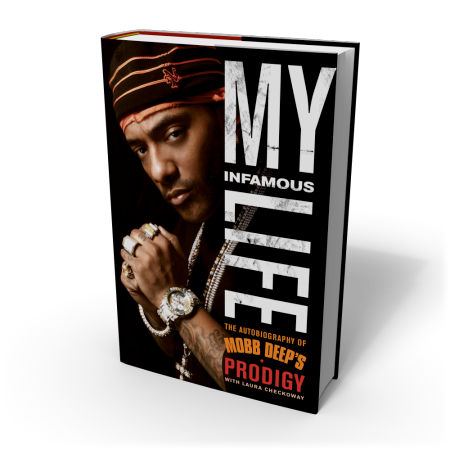How Prodigy Told His Life Story
The late Mobb Deep rapper’s memoir is one of the best music autobiographies ever — his coauthor explains how he did it from behind bars
(AP Images/Ringer illustration)

“I’m not scared to die, I’ve dealt with enough,” said Prodigy in 2008. It’s a sentiment expressed often enough in rap music that it’s become a cliché — but in P’s case, it wasn’t just the usual live-fast-die-young pessimism. “I feel like my life is gonna be short anyway because of my sickle cell,” he said. On Tuesday, Prodigy
passed away at age 42, the
median life expectancy for men with his condition.
The quotes above appeared in
a February 2008 cover story for the Village Voice, written by Laura Checkoway. At the time, Prodigy was days away from beginning a three-and-a-half-year prison sentence for gun possession. In the months prior to getting locked up, the rapper had begun collaborating with Checkoway, then a freelance journalist, on a book about his life. The resulting tome,
My Infamous Life: The Autobiography of Mobb Deep’s Prodigy, was published upon his release from prison in 2011. “I’m so thankful that we were able to do that work,” Checkoway tells me, the day after Prodigy’s death.
Finishing the job was no easy task. The book was pieced together from four years of interviews, the bulk of which were recorded while P was in prison. Before publication, there was a disagreement with Simon & Schuster over the cover art and extensive legal reviews of potentially incriminating text. What was left within created an immediate firestorm.
My Infamous Life was an unforgiving tell-all, chock full of beef and bullets. Names were named; subsequently, feelings were hurt.
The blowback eventually died down.
My Infamous Life is now widely regarded as one of hip-hop’s best memoirs, and as of Tuesday, an essential document in the legacy of a rap legend. It is at times brutal and cold in its honesty, yet always with an underlying feeling of vulnerability and pain — a perfect reflection of the artist himself.
(Laura Checkoway)
OnOctober 26, 2006, Prodigy was stopped by undercover police for making an illegal U-turn in Manhattan and then arrested for the .22-caliber gun found in his Chevy Suburban. As covered in Checkoway’s
Voice article and later in
My Infamous Life, Prodigy had long been a target of the NYPD’s “rap intelligence unit.” Their surveillance accelerated when Prodigy became affiliated with 50 Cent, who had signed Mobb Deep to his label the previous year. Having escaped significant jail time for a bevy of past crimes, P felt that this latest charge was one he might not be able to get out of. “He told me he just felt like it was his time,” recalls Checkoway. “He’d gotten off so many times and now it was his time to go to jail.”
A prolific year followed the initial arrest, as Prodigy released a heralded mixtape with the Alchemist (
Return of the Mac); began recording his next solo album (
H.N.I.C. Pt. 2) and a side project (
Product of the 80s); and uploaded a slew of DIY videos to the internet. As one-half of Mobb Deep, Prodigy had always been a master at conveying stoic aggression. On his own, though, his music became increasingly dark and paranoid; so, too, were
the accompanying visuals. He was impatient, and he was angry. Despite facing 15 years of prison time, he still couldn’t avoid rap beef, this time with a Brooklyn up-and-comer called Saigon. Outside of music, P was in and out of the hospital, where periodic sickle-cell crises necessitated stays of varying lengths. It was during one of those hospital stays that Prodigy first started writing out his life story.
A bound manuscript of a few rough chapters — typed in all caps,
as was his wont — landed on the desk of an editor at Simon & Schuster who recognized the potential, but also knew the project would need a collaborator. The editor asked Checkoway, formerly an editor at
Vibe magazine, if she was interested. Checkoway signed on, and the road to
My Infamous Life began.
Checkoway describes her initial sessions with Prodigy as a “feeling-out period” in which the two would exchange ideas over the phone, or meet in the hospital or at Alchemist’s Manhattan apartment. Anticipating prison time and scrambling to make music to leave behind, Prodigy became increasingly hard to pin down. On October 8, 2007, he accepted a plea deal to serve three and a half years in prison rather than try to beat the case. “I was shocked when he pled guilty,” says Checkoway. “Even his attorney was surprised.” As was her book agent: When Checkoway sent him news of P’s sentencing, he apologized that she’d wasted her time on the project.
But the book only really took shape once Prodigy was officially incarcerated, on March 7, 2008. “That’s when the actual work really feels like it began,” says Checkoway. “P and I recognized that now he’d have time to sit still and focus on the book and I was determined to see it through.” They quickly fell into a process: Prodigy would dial Checkoway’s landline from prison, and she would record their conversations, which would go on for as long as rules allowed. “It was an incredible amount of writing and transcribing and work,” she says. Hours of transcription were formed into edited chapters; follow-up calls filled in the missing details.
(Laura Checkoway)
And what details they were. There are the standard autobiographical beats — P’s lineage from a musical family and travails as a precocious youngster — but also poignant scenes that reveal the extent of his lifelong suffering from sickle cell. In one vivid childhood memory, Prodigy describes choosing a bus seat directly underneath the sun’s glare: “I sat very still without moving a muscle. Fifteen minutes later, I got off the bus and the pain was gone. I had learned a new trick!” Cold triggered his debilitating sickle-cell symptoms, so he was constantly devising ways to fight it. At age 13, he half-heartedly attempted to kill himself to escape the pain.
By the time a teenaged Prodigy embarks on his musical career and fully embraces the rap life, the book unspools into a vivid and comprehensive chronology of guns, drugs, and chaos. Being a high-profile rapper in New York in the ’90s was not a job for the faint of heart — and even less so for one repping the notoriously competitive Queensbridge projects. There is a pervasive, palpable tension throughout the book that provides context for the looming dread that came to define Mobb Deep’s music. Seemingly no one can be trusted. Every encounter with friend or foe feels like it could explode into violence — and it often does, in unsparing description. “We had a great partnership because he’s such a great storyteller, and then I am all about details and emotions,” says Checkoway. “It was a really unique combination in that way.”
The narrative that emerges is one of a perennial outsider who — whether because of his disease, or his diminutive stature, or his Long Island roots — is constantly fighting for respect and lashing out at those who he feels have slighted him. Naturally, Prodigy makes himself the hero in most of his stories, but there is vulnerability, too. He’s insecure about the state of his teeth, which cost him $20,000 to fix. He breaks down and cries in front of his girl after getting his chain snatched by a QB associate. He’s envious of and intimidated by Nas’s talent. He admits that his rhymes became “lazy and sloppy” in the wake of Jay-Z’s “Takeover” war against him. “P was really willing to go there in a way that made the book what it is,” says Checkoway.
Of course, every life has some moments of levity. (Prodigy usually punctuates them with a “Ha!”) He uses childish nicknames for enemies who he apparently never forgave (“Deaf Squid” for “Def Squad”; “Fakey” for “Lakey”) and brashly dismisses artists he doesn’t like. There are tales of unrequited flirtations with Mary J. Blige, Lil Kim, and … Lindsay Lohan. “While writing, I would be at my desk laughing out loud by myself so often,” says Checkoway. “So I just knew that people were gonna love this book so much.”
(Laura Checkoway)
Once their rough draft was substantive enough, Checkoway sent the manuscript to Prodigy in prison. He would meticulously write revision notes on legal pads, which he’d then return to Checkoway by the boxload — edits and add-ons for the book, but also “his thoughts on Obama and all the presidents having the same bloodline,” says Checkoway, laughing. (Reports emerged this week that Prodigy’s next project was to be
a musical about the Illuminati.)
“It was awesome to see P grow as a writer,” says Checkoway. “In the beginning, the book was filled with curse words and I explained why it seemed best to cut them down so that when he uses those words, it means something. By the end, Prodigy was cutting out curse words and editing himself.”
(Simon & Schuster)
As
My Infamous Life finally neared publication — timed to follow his March 2011 release from prison, after exactly three years served — there were still a few hurdles left to clear. Prodigy preferred to use
the artwork for his single “Keep It Thoro” as the book cover, while Simon & Schuster wanted to use a more recent picture, a close-up which featured him brandishing a hand full of jewelry. “He didn’t like the energy of the cover image and all the flashy jewelry because he felt it didn’t represent him anymore,” says Checkoway. The publisher won that one.
There was also the matter of the many detailed first-person accounts of criminal activity, both by Prodigy and people he names in the book. Checkoway’s early career stint as a magazine fact-checker came in handy. In some cases, she sought out subjects in the book to directly verify stories — including the late Chris Lighty, who managed Mobb Deep for a time. An exhaustive legal review of the book’s most sensitive material followed, conducted not only by a team from Simon & Schuster but also by P’s own lawyer, to ensure he wasn’t implicating himself. “We took a lot of stuff out,” says Checkoway.
On April 19, 2011, just over a month after Prodigy came home from prison,
My Infamous Life was released. With all of the backstories involving prominent rappers, it proved irresistible fodder for the blogosphere. Artists like
Noreaga,
Capone, and
Ja Rule immediately disputed some of the passages that involved them. Fresh out of prison and unbowed by the rebuttals, Prodigy eagerly promoted his memoir. “My mind, body, and soul are in excellent condition now,” he had written in the book’s intro. “I’ve never felt so invigorated.” He soon recorded over 13 hours worth of voice-over for the
My Infamous Life audiobook, which is currently
a top 50 seller. Listening to it now in P’s inimitable voice and cadence is a powerful way to experience his tumultuous life story.
His coauthor has yet to hear it, and with reason. Checkoway listened to all of Prodigy’s words firsthand while recording and transcribing the countless hours of interviews for the book. “I felt it was my role to tell P’s truth,” she says, reflecting on the experience. In the acknowledgements, Prodigy writes the following about his “partner in scribe”:
This gracious young woman has gone the extra one hundred miles because she knows the importance of this story. Checkoway, who is now a documentary filmmaker, says she still gets letters from incarcerated men who have read the book and have gone on to write their own stories. In the days since Prodigy’s death, she’s been inundated with warm messages from fellow writers, fans, and strangers. Given the renewed prominence of its subject, a film adaptation doesn’t seem far-fetched.
And it took a three-year prison bid for it all to come to fruition. “This book is a damn miracle,” Prodigy writes early on in
My Infamous Life. “I never thought I would be writing my life story, but once I started getting it all down, I realized that it could help inspire others to do great things with their own lives.”
“So here it is,” he continues. “I’m sharing, dammit.”
 a lot of people felt p was wilding out wit that book tho
a lot of people felt p was wilding out wit that book tho
 so fukking smooth.
so fukking smooth.so fukking smooth.



